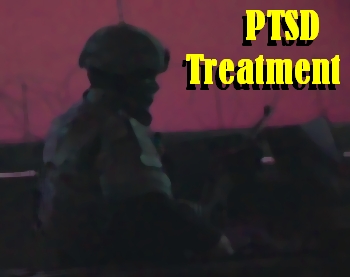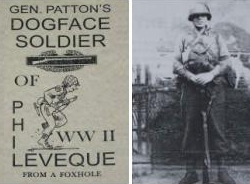
Publisher:
Bonnie King
CONTACT:
Newsroom@Salem-news.com
Advertising:
Adsales@Salem-news.com

~Truth~
~Justice~
~Peace~
TJP
Oct-29-2007 02:32

 TweetFollow @OregonNews
TweetFollow @OregonNews
PTSD and Virtual Reality Exposure Therapy
Dr. Phil Leveque Salem-news.comPhil Leveque has spent his life as a Combat Infantryman, Physician, Toxicologist and Pharmacologist.
 Salem-News.com |
(MOLALLA, Ore.) - According to almost anyone suffering from PTSD, their pharmaceutical therapists, psychotherapists, psychologists and any of thousands of workers in this field admit if truthful that almost nothing tried thus far has worked.
The first written reference to PTSD was in 1900 B.C. by an Egyptian Army physician who called it "hysterical reaction to trauma".
This was reported nearly 4,000 years later by Veith in 1965. It is probable that it occurred in every war since, and it is also probable that the self-medicating treatment was alcohol, which is still used widely today.
The U.S. Civil War produced "soldiers disease" which was most likely PTSD plus opium addiction, and opiates are still used for PTSD today. The Spanish-American War gave us Cuba Libras (rum & lime juice) and World War I gave us Cognac, lots of French wine and probably lots of opiates.
World War II in addition to booze, gave us barbiturates which work both as tranquilizers and sleeping pills.
The Vietnam War produced innumberable PTSD patients and a wild grab-bag of psychopharmaceuticals, none of which are very effective and most of which case adverse side effects which patients say are worse than PTSD itself Most bail out of VA therapy and end up self-medicating with alcohol and what the medical profession calls: drugs of abuse.
Other than alcohol, which is universally available, many Vietnam veterans discovered over there that marijuana worked better than any prescriptions they have been given. Marijuana according to the U.S. government is a very dangerous drug, but many thousands of users deny this.
The newest treatments in view of past failures is Virtual Reality Exposure Therapy in which PTSD patients are subjected to "real or surrogate threat" (battle sounds) "in a safe environment to help them overcome their fears." This is a quote from the summary of the National Academy of Science Institute of Medicine report of Oct. 18th, 2007.
I know of many World War II veterans including myself who saw Private Ryan, Band of Brothers and most recently Ken Burns' The War. The latter is so realistic I was about to dive under the furniture. I can only watch it about an hour at a time.
I was an infantry Battalion Scout and point man and exposed to far more artillery fire, mortar fire and machine gun fire than I care to remember, and I also have had "battle fatigue" or PTSD as do most Infantry battle veterans.
I am extremely dubious about the new "exposure therapy". PTSD like any other disease can be graded from one to ten with ten being totally intolerable and disabling and probably was the "shell shock" of World War I.
Gradual treatments of exposure therapy may help those in the 3 or 4 category but PTSD veterans in the 6, 7 or 8 category will most likely "flip out". I'm pretty damned sure I would. It took me years to endure large fire crackers and truck backfires.
I my career I have successfully treated about 500 veterans with cannabis and they still say it works better than any prescription.
 You can email your questions to the doctor: newsroom@salem-news.com
You can email your questions to the doctor: newsroom@salem-news.com
 More information on the history of Leveque can be found in his book, General Patton's Dogface Soldier of Phil Leveque about his experiences in WWII. Order the book by mail by following this link: salem-news.com/pages/Dogface_soldier.
More information on the history of Leveque can be found in his book, General Patton's Dogface Soldier of Phil Leveque about his experiences in WWII. Order the book by mail by following this link: salem-news.com/pages/Dogface_soldier.
If you are a World War Two history fan, you don't want to miss it.
Watch for Dr. Phil Leveque's video question and answer segments about medical marijuana with Bonnie King.
Other articles and video segments about medical marijuana on Salem-News.com:
- Oregon Medical Marijuana Doctor Tells All: Q&A Part 6 (VIDEO)
- Medical Marijuana: Treatment for Marijuana Dependence
- Medical Marijuana Medical Conditions
- Medical Marijuana Medical ConditionsConnecticut Governor Vetoes Medical Marijuana Bill
- Medical Marijuana: PTSD Medical Malpractice
- Marine Combat Vet Discusses Iraq, PTSD and Medical Marijuana
- The Most Dangerous Man in Oregon
- Medical Marijuana: What it's About
- Oregon Medical Marijuana Doctor Discusses PTSD Treatment (VIDEO)
- PTSD: Life-Long Challenge For Growing Number of Veterans
- Medical Marijuana: A California Success Story
- Oregon Medical Marijuana Doctor Tells All: Q&A Part 3 (VIDEO)
- Medical Marijuana: The Replacement for Very Dangerous Drugs
- Oregon Toxicologist Says Treatment for PTSD Should Include Cannabis
- Medical Marijuana Doctor Responds to Written Comments (VIDEO) (Originally titled Oregon Medical Marijuana Doctor Tells All: Q&A Part 3)
- Oregon Medical Marijuana Doctor Answers All (VIDEO)
Articles for October 28, 2007 | Articles for October 29, 2007 | Articles for October 30, 2007



googlec507860f6901db00.html

Quick Links
DINING
Willamette UniversityGoudy Commons Cafe
Dine on the Queen
Willamette Queen Sternwheeler
MUST SEE SALEM
Oregon Capitol ToursCapitol History Gateway
Willamette River Ride
Willamette Queen Sternwheeler
Historic Home Tours:
Deepwood Museum
The Bush House
Gaiety Hollow Garden
AUCTIONS - APPRAISALS
Auction Masters & AppraisalsCONSTRUCTION SERVICES
Roofing and ContractingSheridan, Ore.
ONLINE SHOPPING
Special Occasion DressesAdvertise with Salem-News
Contact:AdSales@Salem-News.com
Terms of Service | Privacy Policy
All comments and messages are approved by people and self promotional links or unacceptable comments are denied.
Dr. Albert Rizzo October 29, 2007 10:26 pm (Pacific time)
Thank you Dr. Leveque for recognizing the potential value of Virtual Reality Exposure Therapy for at least some cases of PTSD. I am spearheading such a project and have seen successful outcomes in our initial trials that are very encouraging. I believe that our method of putting a soldier initially in a VR simulation that is only vaguely reminicent of the combat environment at first, and only then when they can handle that, very gradually increasing the level of stimulation at a pace that they can manage, will turn out to hold great promise for our warriors ultimate return to something that resembles a healthy civilian life. If you are ever in Los Angeles, look me up at the Univ. of Southern California and I will be glad to give you a mellow demo of the treatment tool that we have developed. Best Regards, Dr. Rizzo
dick613 October 29, 2007 3:55 am (Pacific time)
Hello Dr. You my friend are totally correct. I have been receiving "treatment" in the form of Paxil then Prozak when that did not work. I am sure you know the outcome already. They do not work. My time came in Vietnam, I just thought I was crazy until I found I had bad PTSD almost 5 years ago. I can tell you from my sad experience that the "cure" is worse than the disease. Thanks for all of your good work.
[Return to Top]©2026 Salem-News.com. All opinions expressed in this article are those of the author and do not necessarily reflect those of Salem-News.com.